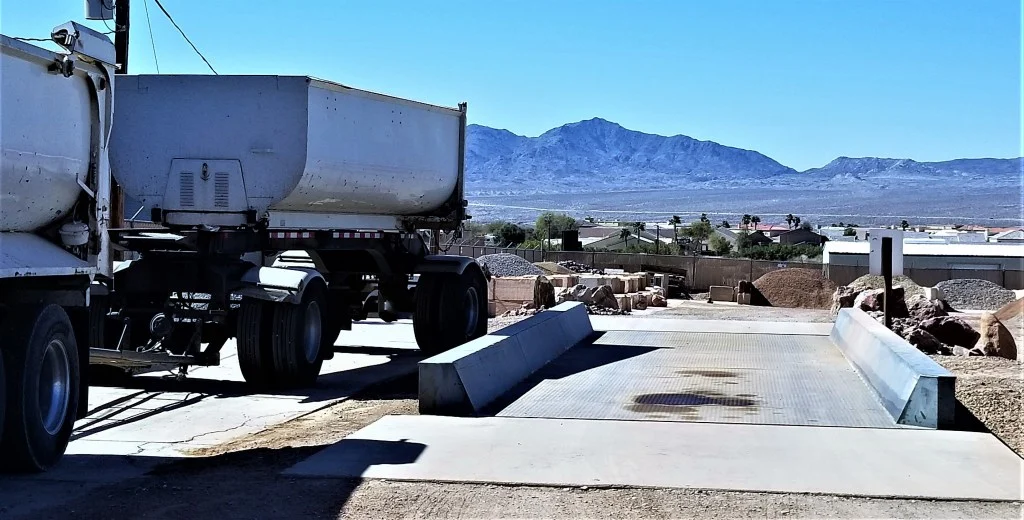Did you know there are maximum trailer weight ratings for utility trailers and RVs? This means you need to know the weight of your trailer no matter what kind of hauling or towing you’re doing. If you don’t, you risk expensive repairs or completely ruining your trailer.
Let’s take a closer look at how to weigh your trailer, specifically if your only option is to weigh it at home. Let’s dive in.
How Do I Determine the Unloaded Weight of My Trailer?
Every manufacturer puts up a sticker that gives the unloaded weight and the gross vehicle weight rating (GVWR) somewhere on the trailer. This includes cargo trailers as well as RVs. This might be inside a door or along an exterior wall. If you locate the VIN sticker, you might also find the unloaded weight printed there.
If you want to weigh your empty trailer to find the actual unloaded weight, head to a CAT Scale at a nearby truck stop. These scales are large enough to weigh semi-trucks, so they’re plenty large to weigh a cargo trailer or RV. It’s easy to just pull up onto the scale and follow the prompts on the app.
If you have a small cargo trailer and don’t want to disconnect the tow vehicle, make sure the vehicle is completely off the scale. Then make sure the entire trailer is on the scale. If you weigh the trailer and tow vehicle together, you’ll need to park and drop the trailer and then return to the scale to weigh just the tow vehicle. Then you can subtract the vehicle’s weight from the total combined weight to find out the unloaded weight of the trailer only.
What Is the Difference Between Tongue Weight and Trailer Weight?
It’s important to know the weight of both the tongue and the trailer. The tongue weight is the force the tongue of a trailer applies to the hitch of the tow vehicle. Sometimes tongue weight is also called hitch weight.
The right amount of tongue weight for a trailer with a ball-mounted hitch is 10% to 15% of the trailer weight. So if a 3,000-pound cargo trailer has 1,000 pounds of weight, the tongue weight shouldn’t exceed 400 to 600 pounds.
Pro Tip: Not weighing your RV can cause many problems! Find out what happened when an RVer stopped weighed their RV for five years.

How Can I Weigh My Trailer at Home?
The easiest way to weigh a trailer at home is with a tongue weight scale. This may be too expensive for some people, so weighing with a bathroom scale is also an option. Before using any scale, make sure you chock the wheels and the trailer is level.
Tongue Weight Scale
A tongue weight scale is much easier to use than a bathroom scale because it can handle the weight of the trailer tongue. You’ll want to raise the scale to measure the tongue’s weight at the height it’s being towed. Just stack a couple of blocks underneath the scale. Then lower the coupler onto the scale and read the gauge.
Tongue weight scales have ranges they can measure, so make sure to buy the right weight range for your trailer.
Bathroom Scale
Place a two-by-four at least 3.5 feet long under the trailer’s tongue. Then put the scale either 2 feet in front or 2 feet behind the tongue. Put something on top of the scale to protect it, like a piece of plywood. Use a block or brick on the opposite side of the scale, about 1 foot from the trailer tongue.
Finally, put two horizontal pipes between the scale and two-by-four. One should go in the center of the bathroom scale, and the other should go in the center of the brick.
The bathroom scale can’t handle the entire weight of the trailer tongue. So when you lower the jack until the coupler is resting on one of the pipes, you’ll need to multiply the scale reading by three.

Where Can You Go to Get Your Trailer Weighed?
As already mentioned, the best place to get your trailer weighed is at a certified CAT scale. You can weigh your trailer completely empty to figure out the unloaded trailer weight. But you can also weigh your trailer fully loaded to see if you’re over the GVWR of the trailer or the towing capacity of your tow vehicle. Staying within these limits is critical for a safe towing experience for you and other drivers.
You can find a nearby CAT scale by using the locator feature online. You can also download the locator app and the Weigh My Truck app. With this app, you can easily weigh your tow vehicle and trailer from your smartphone and pay for the transaction.
How Do You Distribute Weight Evenly on a Trailer?
You should put heavier items closer to the front of the trailer and lighter items toward the back. If the trailer is enclosed, place heavier items on the floor and lighter ones near the top. You also want to make sure to evenly load the trailer from side to side.
What Happens If You Pull a Trailer That’s Too Heavy?
When you pull a trailer that’s too heavy, you risk putting too much stress on the trailer’s frame and tires. The GVWR of an RV or the loaded weight of a utility trailer is the maximum weight set by the manufacturer for a reason.
If the trailer weight is too heavy for your tow vehicle, you risk putting too much stress on the brakes, transmission, and engine. Again, the manufacturer sets the tow vehicle’s towing capacity for a reason. You’ll end up with expensive repairs or ruin the vehicle.
Pro Tip: We compared fourteen types of RVs to determine How Much Do RVs Weigh?
Is Weighing a Trailer Important?
Whether you’re towing a cargo trailer, travel trailer, or fifth wheel, knowing the trailer’s weight is vital for a safe towing experience. You never want to exceed the trailer’s gross weight or the vehicle’s towing capacity. So whether you weigh your trailer at home or on a certified CAT scale, don’t ignore this task. Drive safely and tow safely.
Do you know the weight of your trailer?
Discover the Best Free Camping Across the USA
To be honest with you, we hate paying for camping. There are so many free campsites in America (with complete privacy).
You should give it a try!
As a matter of fact, these free campsites are yours. Every time you pay federal taxes, you’re contributing to these lands.
Become a FREE CAMPING INSIDER and join the 100,000 campers that love to score the best site!
We’ll send you the 50 Best Free Campsites in the USA (one per state). Access the list by submitting your email below: